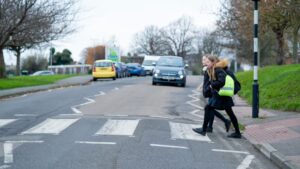Local authorities should be give a five-year funding settlement to help support future investment and planning for active travel, according to a new report by the All-Party Parliamentary Group for Cycling and Walking (APPGCW).
In its report, Reaching Our Active Travel Potential, the Group said a ‘funding horizon’ of five years is ‘optimal long enough’ to enable transport/highway authorities to build teams and manage programmes successfully but at the same time giving central government the fiscal control it needs.
The Group reported that witnesses it spoke to for the report mentioned National Highways (formerly Highways
England) and Network Rail as two organisations hat have benefited from the certainty of such a funding arrangement.
“An in-principle sum would be allocated to each authority, based on analysis of current and potential levels of active travel, and consistent with national targets,” said the report. The Group suggests that ‘as each authority submitted its statutory Active Travel Plan a negotiation process would then take place, led by Active Travel England, leading to a firm allocation split over the five years.’
The report also calls for the introduction of a new Highways Act. The purpose of which would be to require highway authorities to develop and manage their networks in accordance with the need to achieve the goals of environmental sustainability and improved public health. With a specific emphasis on cycling and walking, the Act would impose on authorities a requirement to improve facilities for active travel as part of any change to the road network.
The other recommendations included:
*Set national active-travel targets consistent with Net Zero
*Transport/highway authorities to negotiate local targets consistent with national targets
*Local Cycling and Walking Infrastructure Plans providing a coherent, balanced active-travel network that includes rights of way
*Central government to support transport/highway authorities in rapidly acquiring skills and capacity
*Intensive support for struggling authorities
The report also recommends that a new standard is created for active travel to ensure councils adhere to issues of justice when planning further active travel.
Selaine Saxby MP, co-chair of the APPGCW, said: “Since the first Cycling and Walking Investment Strategy (CWIS), the government has shown significant commitment to growing walking and cycling. With this in mind, we commissioned this report to help focus on what is needed from CWIS2 to harness that recent progress and better understand the challenges and complexities. The result is an important set of recommendations, which we hope will help to deliver further positive change.’’
Ruth Cadbury MP, co-chair of the APPGCW, said: “It is an incredibly exciting time for active travel; with Gear Change, LTN 1/20 and preparations in motion for the establishment of Active Travel England. Whilst there is much to be positive about, it is also clear that far more work is needed to realise the potential of active travel and the role it can play in decarbonising our transport network. This report provides a broad and detailed overview of what is needed to take that next step in delivering wider uptake of cycling and walking – and the many benefits associated.’’
Commenting on the report, Stephen Edwards, Interim CEO, Living Streets said: “Walking is the cheapest, greenest, healthiest transport there is. However, as this report highlights, it needs ambitious targets and investment. Funding for active travel provides excellent value for money, helping to tackle the costs associated with air pollution, inactivity and loneliness and helping achieve Net Zero by 2050 or before.
“Long-term, stable funding is needed in the upcoming Spending Review to make it easier, safer and more attractive for people to choose cleaner ways to travel for many years to come.”
The full report can be read here: APPGCW-CWIS2-Report-Final.pdf (allpartycycling.org)























